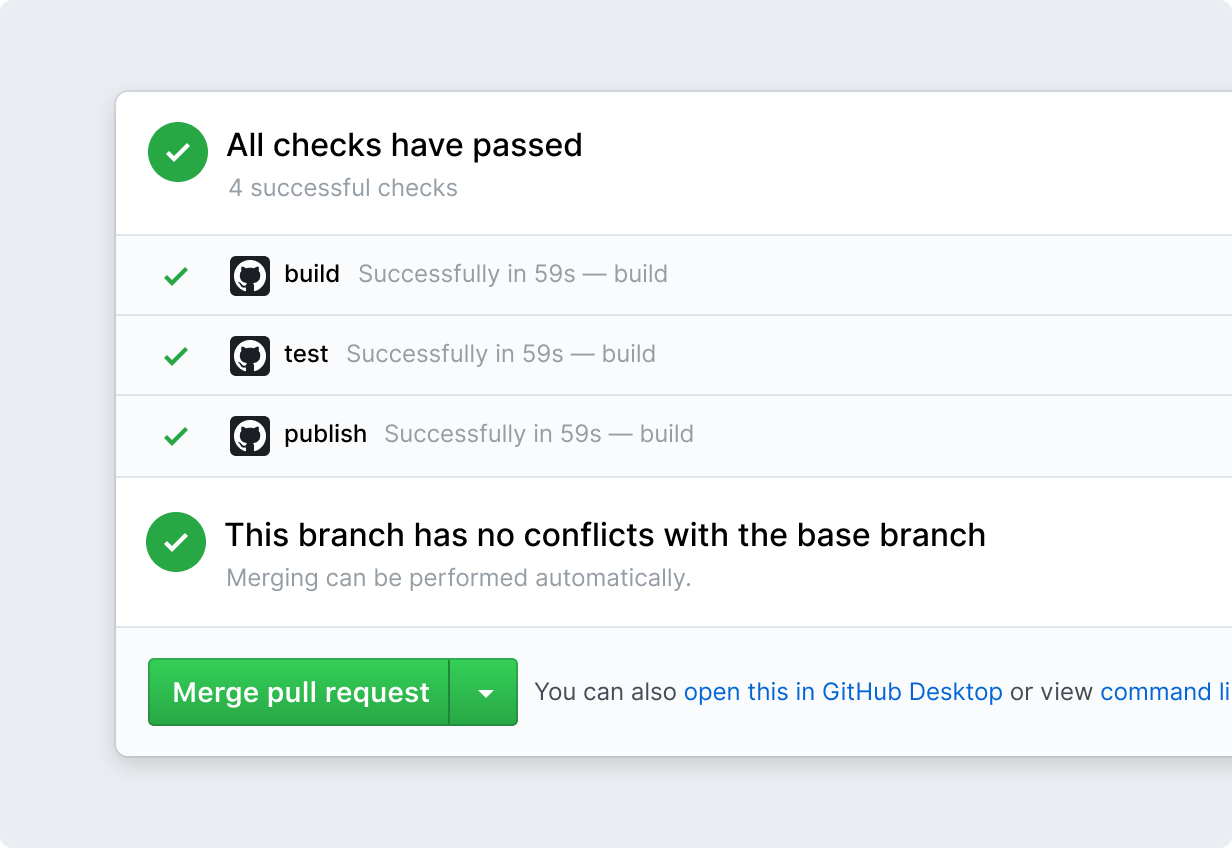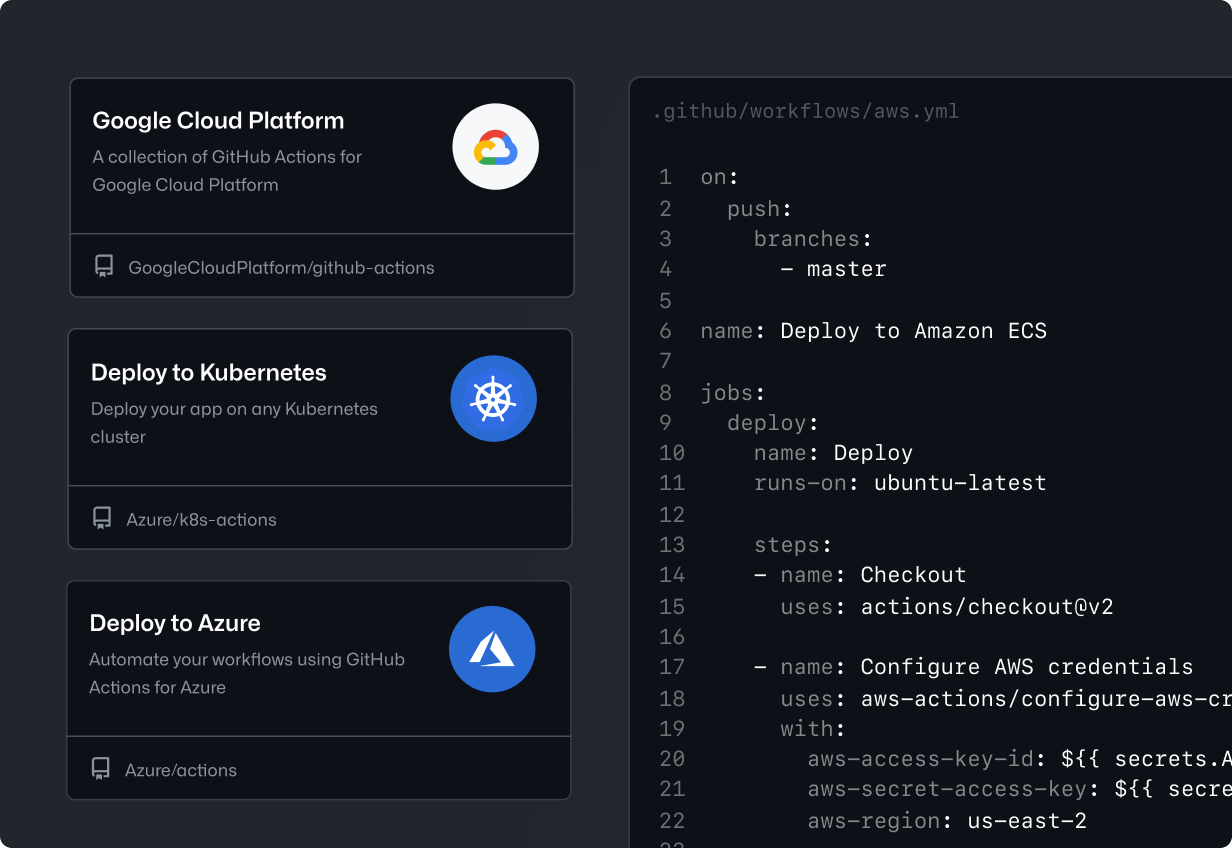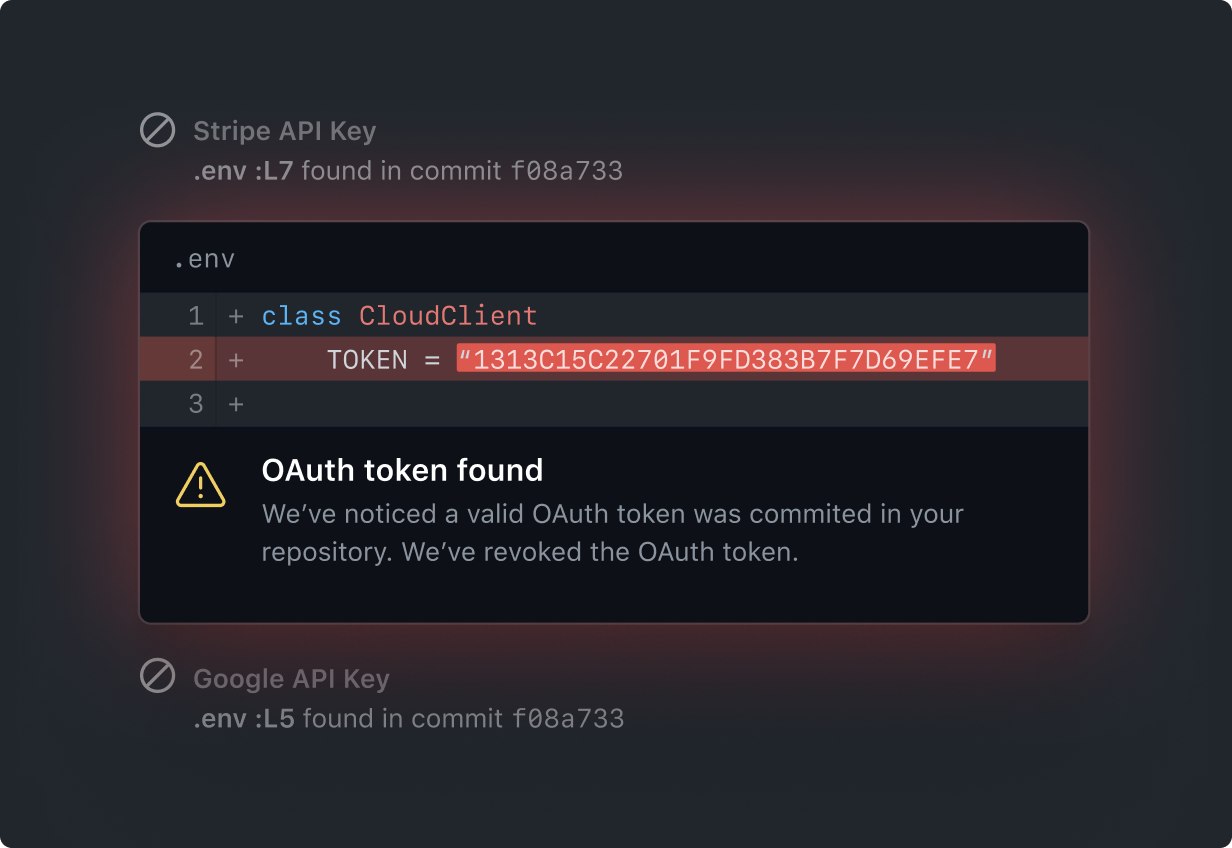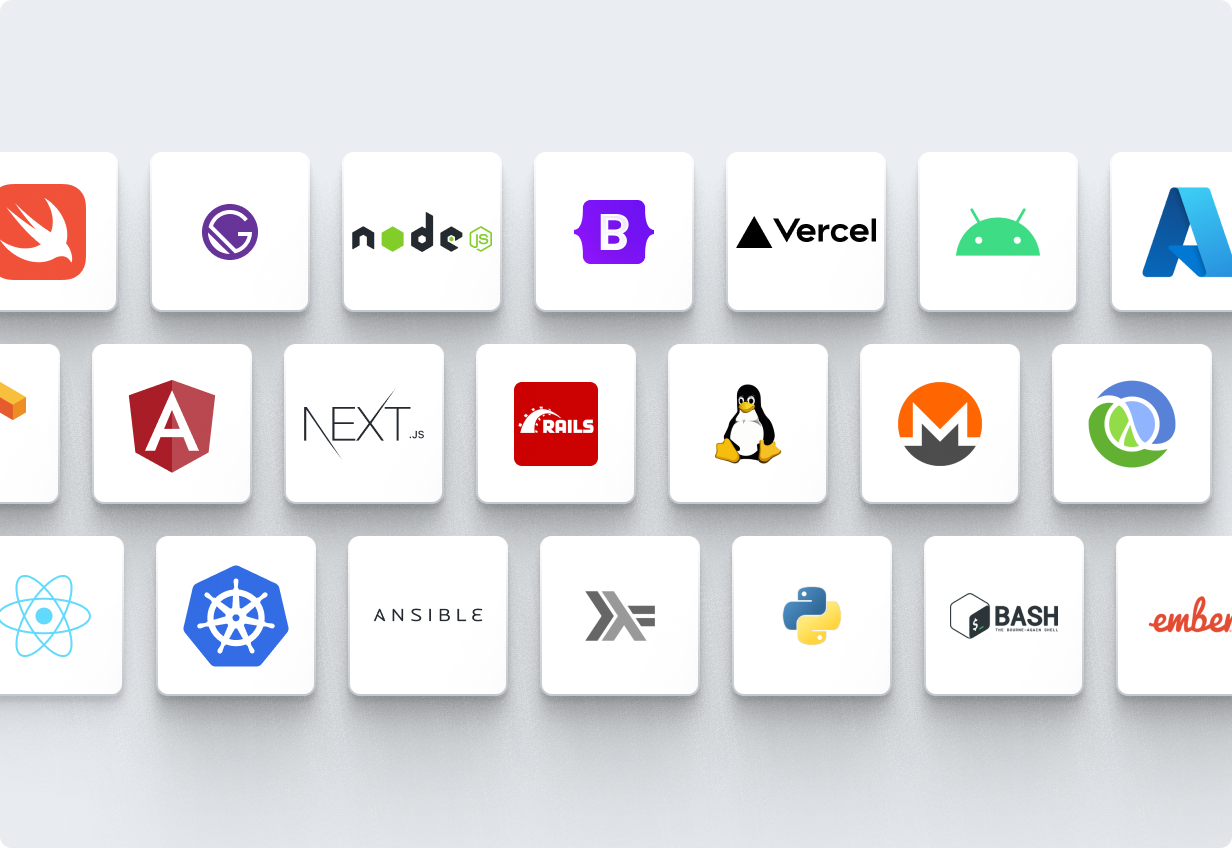Compare GitHub to the competition (original) (raw)
GitHub vs. GitLab and other DevOps tools
More than 90% of the Fortune 100 use GitHub Enterprise
DevOps is just the beginning. From McKesson to Meta and Spotify to SAP, many of the world's biggest and most innovative companies are built on GitHub—the leading developer platform compared to alternative solutions.
Why teams choose GitHub





Build on the most loved developer platform
Build what's next with the all-in-one solution that's beloved by developers. Go from ideation to planning, project management, security, automation and delivery with extensive native capabilities and a rich integration ecosystem.
Learn more

Scale faster with powerful CI/CD
Build your DevOps practice with native CI/CD that responds to any webhook. Bring your preferred tools seamlessly into your workflow with a rich ecosystem of integrations in the GitHub Marketplace—or build your own integrations with GitHub Actions.
Explore the GitHub Marketplace

Stay secure at every step
Empower developers to fix vulnerabilities in minutes with the only community-driven, native application security testing solution on a platform designed for dynamic teams and regulated industries.
Learn more

Home to the world's largest open source registry
Accelerate your workflows and scale your business fast with access to millions of open source projects on GitHub, the largest source code host.
Learn more

What our customers are saying
GitHub keeps us up to speed with the industry's best tools. We want new hires to know GitHub is in our toolchain—it makes them excited to join us.
It's like night and day. It's the collaboration, it's the sharing, it's the community. It's all because of GitHub.
One of the big benefits of using GitHub for CI/CD and security automation is that we don't have to build, deploy, or maintain additional tools.
We're a developer-first organization and we live and breathe GitHub. It's not just a developer platform for us.
How GitHub compares to other DevOps platforms
There are dozens of alternative DevOps tools from best-in-breed point solutions to full platforms. So how does GitHub compare? There are plenty of analyst reports that answer that question--but here's an overview to help you get started.
GitHub vs. GitLab for DevOps
| Use case | GitHub | GitLab |
|---|---|---|
| Desktop and Mobile Support, CLI | GitHubNative desktop app for macOS and Windows.Native iOS and Android mobile applications to enable collaboration on any device.Native CLI to enable collaboration via your terminal. | GitLabThird-party apps with limited capabilities. |
| Planning, tracking, and project management | GitHubComparable native capabilities | GitLabComparable native capabilities |
| Collaboration | GitHubComparable native capabilities | GitLabComparable native capabilities |
| Application security | GitHubNative core capabilities based on GitHub's own IP with GitHub Advanced SecurityIntegrations to third-party commercial products and open source solutions via support for the SARIF format | GitLabCore capabilities based on embedded open source projects and integrations with other open source solutions. |
| Automation & CI/CD | GitHubComparable native core capabilitiesOver 17,000 GitHub Actions are available in the GitHub Marketplace to automate your development workflow. | GitLabComparable native capabilities |
| Innovative coding capabilities | GitHubCloud-hosted developer environments with GitHub CodespacesAI programming assistance with GitHub CopilotThird-party integrations | GitLabThird-party integrations |
| Platform security | GitHubComparable native capabilitiesComplete control over identity provisioning, access and removal of permissions with Enterprise Managed Users in the cloud.Certifications:GDPR CompliantISO 27001:2013SOC 1 Type 2SOC 2 Type 2ISAE 2000ISAE 3402FedRAMP LI-Saas Authorization to Operate (ATO)Trusted Cloud Provider(™) with the Cloud Security Alliance (CSA) | GitLabComparable native capabilitiesCertifications:ISO 27001SOC 2 Type 2 Report: Security and Confidentiality CriteriaSOC 3 Report: Security and Confidentiality CriteriaISO/IEC 20243-1:2018 Self AssessmentCSA-StarPCI DSS SAQ-A Self-Assessment |
| Scalability | GitHubComparable native capabilitiesHosts the world's largest code graph with over 100 million registered users on github.com, and more on self-managed deployments.99.90% uptime guarantee with GitHub Online Services SLA. | GitLabComparable native capabilitiesClaims estimated 30 million users including estimated user counts from self-managed deployments.Uptime SLA is not available. |
GitHub vs. Bitbucket for Devops
| Use case | GitHub | Bitbucket |
|---|---|---|
| Desktop and Mobile Support, CLI | GitHubNative desktop app for macOS and Windows.Native iOS and Android mobile applications to enable collaboration on any device.Native CLI to enable collaboration via your terminal. | BitbucketThird-party apps with limited capabilities. |
| Planning, tracking, and project management | GitHubComparable native capabilitiesNext generation planning and tracking capabilities with the new GitHub Issues experience. | BitbucketVery limited native core capabilitiesRequires Atlassian's Jira (a separate product) for planning and tracking capabilities. |
| Collaboration | GitHubComparable native capabilities | BitbucketComparable native capabilities |
| Application security | GitHubNative core capabilities based on GitHub's own IP with GitHub Advanced SecurityIntegrations to third-party commercial products and open source solutions via support for the SARIF format | BitbucketThird-party integrations with commercial products and open source solutions. |
| Automation & CI/CD | GitHubComparable native core capabilitiesOver 17,000 GitHub Actions are available in the GitHub Marketplace to automate your development workflow. | BitbucketComparable native capabilitiesOnly supports 86 integrations as of 2022-05-16. |
| Innovative coding capabilities | GitHubCloud-hosted developer environments with GitHub CodespacesAI programming assistance with GitHub CopilotThird-party integrations | BitbucketThird-party integrations |
| Platform security | GitHubComparable native capabilitiesComplete control over identity provisioning, access and removal of permissions with Enterprise Managed Users in the cloud.Certifications:GDPR CompliantISO 27001:2013SOC 1 Type 2SOC 2 Type 2ISAE 2000ISAE 3402FedRAMP LI-Saas Authorization to Operate (ATO)Trusted Cloud Provider(™) with the Cloud Security Alliance (CSA) | BitbucketComparable native capabilitiesCertifications:GDPR CompliantISO 27001:2013SOC 2SOC 3PCI DSS Compliant |
| Scalability | GitHubComparable native capabilitiesHosts the world's largest code graph with over 100 million registered users on github.com, and more on self-managed deployments.99.90% uptime guarantee with GitHub Online Services SLA. | BitbucketNo public information on total number of registered users. The last reported number was 10 million registered users in 2019. Uptime SLA is not available. |
GitHub vs. Jenkins for CI/CD
| Use case | GitHub | Jenkins |
|---|---|---|
| Automation & CI/CD | GitHubComparable native core capabilitiesOver 17,000 GitHub Actions are available in the GitHub Marketplace to automate your development workflow. | JenkinsComparable native capabilities1,800+ community contributed Jenkins plugins in Jenkins Plugin Marketplace. |
| Deployment models | GitHubCloud or self-hosted | JenkinsSelf-hosted only CloudBees is the cloud alternative |
Frequently asked questions
What are some quick facts about GitHub Enterprise Cloud?
GitHub Enterprise Cloud offers a cloud-hosted enterprise product plan (SaaS) for large businesses and teams who need a complete DevSecOps solution. It provides tools for greater management of an organization's resources using sophisticated security and administrative features, for example through authentication with SAML single sign-on. GitHub Enterprise Cloud includes support for 50,000 minutes of GitHub Actions runtime for CI/CD workflows and 50GB of storage for shared components and containers. You can learn more about GitHub Enterprise Cloud in our documentation or product page.
How rich is GitHub’s documentation and where can I find it?
GitHub offers thorough documentation around all of its products with detailed how-to guides that walk teams, developers, and administrators through maximizing their investment with GitHub Enterprise. You can find GitHub’s documentation at docs.github.com, which offers a centralized place to find the latest information about GitHub’s products, how to use them, and how to get help. This documentation is kept up-to-date by our documentation teams partnering closely with engineering, our product teams, and our outside community via community contributions.
How do I migrate to GitHub Enterprise Cloud?
If you’re making the move to GitHub, we know you’ll have data you want to bring with you so your team can hit the ground running quickly. We know that fear of migration can be a big barrier to switching to GitHub, which is why we’re working hard to make moving quick, low cost and painless.
GitHub Enterprise Importer is our tried and tested migration tool, used by thousands of GitHub customers to migrate more than 690,000 repositories to GitHub Enterprise Cloud. You can migrate on your own terms with free, self-service migrations from GitHub Enterprise Server, Bitbucket Server, Bitbucket Data Center and Azure DevOps.
If you’re moving from another tool or you’re looking to adopt GitHub Enterprise Server, there are options for you. For more details, and to learn about our tools for planning your migration and moving large numbers of repositories, check out: https://resources.github.com/migrations/
How can I migrate teams from personal GitHub accounts to my organization account?
GitHub offers a simple way to turn personal accounts into organization accounts and migrate teams from personal accounts into organization accounts, too. You can find a full guide on how to do this in our documentation.
Does GitHub offer project planning and source code management in one place?
GitHub offers a complete cloud-hosted developer platform, which includes project planning, source code management, CI/CD, automation, application security and more. All of these features and capabilities are centralized within the core platform making it simple to plan projects, assign tasks, track work, and deploy code from one interface. GitHub’s project planning solution also integrates with task management and forum boards to track decision making trees, conversations, and project statuses. Learn more about project planning with GitHub Issues and how it ties into the everyday developer platform to increase the speed at which you can build, deploy, and scale solutions.
Does GitHub offer pre-built automation and CI/CD workflow templates?
GitHub offers a number of pre-built and community-developed automation workflow templates that enable organizations to build powerful CI/CD pipelines, enforce environmental policies, and more. These workflow templates are designed to meet the needs of leading teams and companies and feature a sizable integration ecosystem. You can find more than 12,000 pre-built automation workflows in the GitHub Marketplace, which contains community-driven and tested automations for security, CI/CD, development workflows, platform integrations, and more. You can also learn more about how automation and CI/CD work on GitHub in our documentation.
Can I use GitHub tools to manage, build, and deploy software to Amazon Web Services (AWS), Microsoft Azure, Google Cloud, a cloud provider of my choice, or my on-site servers?
GitHub offers integrations with AWS, Microsoft Azure, Google Cloud, and other leading cloud providers through the GitHub Marketplace that make it simple to manage, build, and deploy cloud-native applications. GitHub also provides a number of pre-built and customizable CI/CD and automated workflows to manage, provision, and orchestrate cloud computing resources with GitHub Actions.
What is the difference between GitHub and GitLab?
Trying to choose between GitHub vs. GitLab for DevOps? The short answer: It depends on your current business needs and your growth plans. GitHub and GitLab are both mature, cloud-based SaaS platforms that offer native capabilities and integrations with third-party tools. While GitLab has their roots and the majority of their business in on-premises environments, they also have a relatively small cloud offering. GitHub is the home of open source and has been a cloud-native solution since their inception. GitHub also offers on-premises environments. Before making a decision on GitHub vs. GitLab, you’ll likely want to conduct your own research and test each solution.
What is the difference between GitHub and Bitbucket?
Making a decision between GitHub vs. Bitbucket to scale your DevOps practice? The answer depends on what you’re looking to accomplish and your organizational goals. GitHub and Atlassian Bitbucket are both mature platforms with native capabilities and third-party integrations. GitHub offers both a cloud-hosted SaaS model and a self-managed deployment model. In contrast, Bitbucket only offers a self-hosted solution for 500 seats or more with recurring license and support fees and otherwise promotes their cloud-hosted SaaS solution after making an end-of-life announcement for their on-premise Server product).
What is the difference between GitHub and Jenkins for CI/CD?
Trying to decide whether to use GitHub Actions vs. Jenkins? If you’re looking for a cloud-hosted CI/CD solution, GitHub Actions bring extensive and platform-native capabilities to the GitHub platform. Plus, it’s included in GitHub Enterprise. You can also look at CloudBees, which is the commercial variant of Jenkins and fully integrates into the GitHub experience. But where GitHub offers a complete DevOps and DevSecOps platform, Jenkins and its CloudBees commercial solution focus only on automation and CI/CD capabilities.
What is the difference between Git and GitHub?
Trying to understand the difference between Git vs. GitHub? It helps to understand what each solution is. Let’s start with Git: Originally developed in 2005 by Linux inventor Linus Torvalds, Git is a locally installed version control system used to track file changes in development workflows. Its primary purpose is to help developers coordinate work and track changes to source code over time. You can learn more about Git on Git-guides. In contrast, GitHub offers an end-to-end DevOps platform with cloud-hosted Git services—i.e., source code management (SCM) and versioning control. GitHub also includes project management, CI/CD, automation, enterprise-grade security scanning, and more to serve all software development needs.